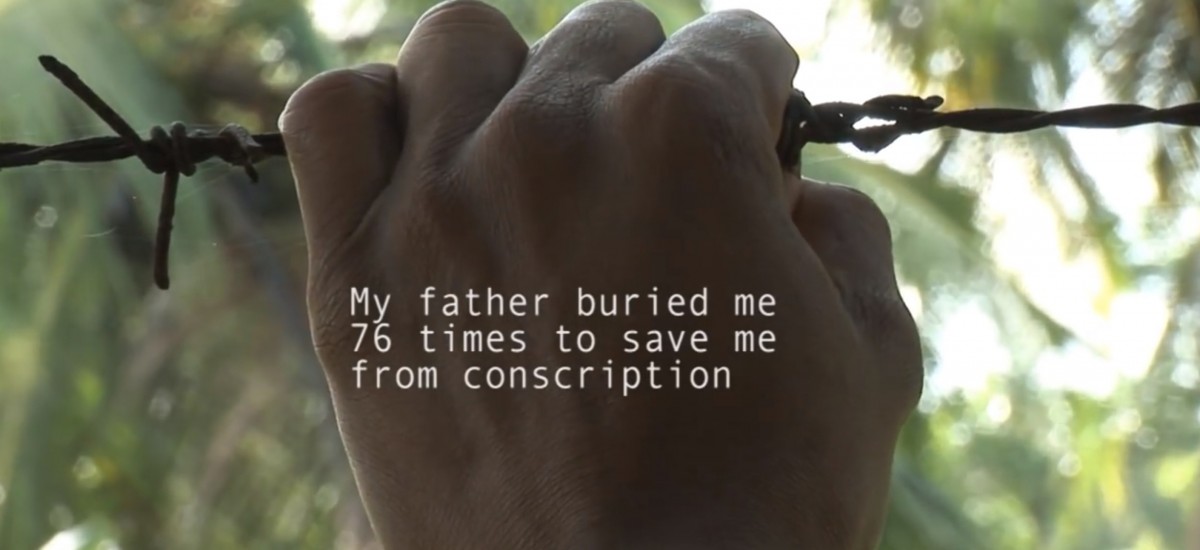“When I’m gone, release me. Let me go.
I have so many things to see and do.”
– Excerpt from ‘Butterfly’
Even today too little is been said about them. Yet, they lived as fighters and died as children in a war they knew nothing about, in a war they had nothing to do with in the first place.
Vishnu Vasu’s documentary poem, Butterfly, is a remarkable tribute to those thousands of child soldiers who died in vain, as well as those who survived despite circumstances. It is also about a filmmaker’s humble journey in finding closure and breaking the silence around what must be remembered as the darkest years of our history. Through this piece I do not intent to review the movie as I feel that no word could match the emotion, humanity and cruel reality depicted through Vasu’s lens. But I do wish to invite those who still haven’t done so to watch ‘Butterfly’.
We all heard at some point of the many tragedies gone through by child soldiers in Sri Lanka; 40% of whom were girls. But we never really got to hear their stories. We never got to hear their fears, their sorrows or even their courage and their hopes. Some had joined the LTTE out of extreme poverty, some out of anger/revenge or simply because they wanted to experience the thrill of holding a gun. Others were abducted and forcefully recruited into the LTTE’s baby brigade before they were turned into innocent killers. It didn’t really matter how old they were. The LTTE training would start at 3 in the morning and would go on with no rest till 11 in the night, as described in the narrative. Those who disobeyed were punished, both verbally and physically.
Those who run off from the training camps were sometimes trapped back in the nets of the militants, often tortured, humiliated and forever deprived of their childhood. Boys, girls, all of them had their heads shaved in order to be easily identified. Villagers, sometimes even relatives, would often report it to the Tigers whenever they came across an escaped child. This was, for them, the only way to save their own child. Insensitivity, as one of the survivors says, appeared as common among the people. Some, however, did risk their lives to save those children of war.
With Butterfly, Vishnu Vasu gave a voice to those children who were forced to give up their innocence to a cause unknown…children whom we failed to save. But he also paid homage to those helpless parents who resisted and sacrificed their life trying to preserve the lives and innocence of their children. Some hid their children in suitcases and carried them on their head. Others sent their child to the forest, or even buried them in order to hide them from LTTE recruiters. Yet, many were those who could not save their child:
“First they came for my son. He died. Then they came for my son-in-law. He died too. Finally they came for my daughter. I pleaded at their feet. But they dragged her away like an animal. The memory of my children haunts me all day long. I feel like ending myself. But I have no choice. I have to live for my grandkids. I am the grandmother of these three innocent kids.” (Testimony excerpt from ‘Butterfly’)
Having to make up for the lost cadres, child-soldiers were often sent to the front line with a cyanide capsule attached around their neck (this practice intensified during the last phases of the conflict). None of them wanted to die. None of them wanted to kill either. They simply had no choice but to obey the rules in order to stay alive. Systematic conscription of children as combatants was one of the worst forms of crimes committed by the LTTE. The fact that the CFA did not contain any provision to put an end to this practice demonstrated a clear weakness in our legal framework.
Today, although Sri Lanka was de-listed by the UN from the ‘List of Shame’, although all ex-child combatants were rehabilitated, reintegrated and provided with formal education, we must remember the stories of this ‘lost generation’; for they did not deserve any of the sufferings they went through. Most of those who survived are now young adults. Some are married or widowed. Others are orphans and/or parents. Their testimonies would haunt anyone who would take the time to listen to them. Their resilience would surprise many of us. But their childhood would always remain a mere shadow that they would forever drag in a harrowing swamp of suppressed memory, muddied with blood.
“Don’t tie yourself with many tears to me.
I gave you my life to a cause unknown.
Now let me rest.
Now let me fly.
Fly away from you.
Fly away to a place so serene,
I will be born a butterfly.”
(Excerpt from ‘Butterfly’)

